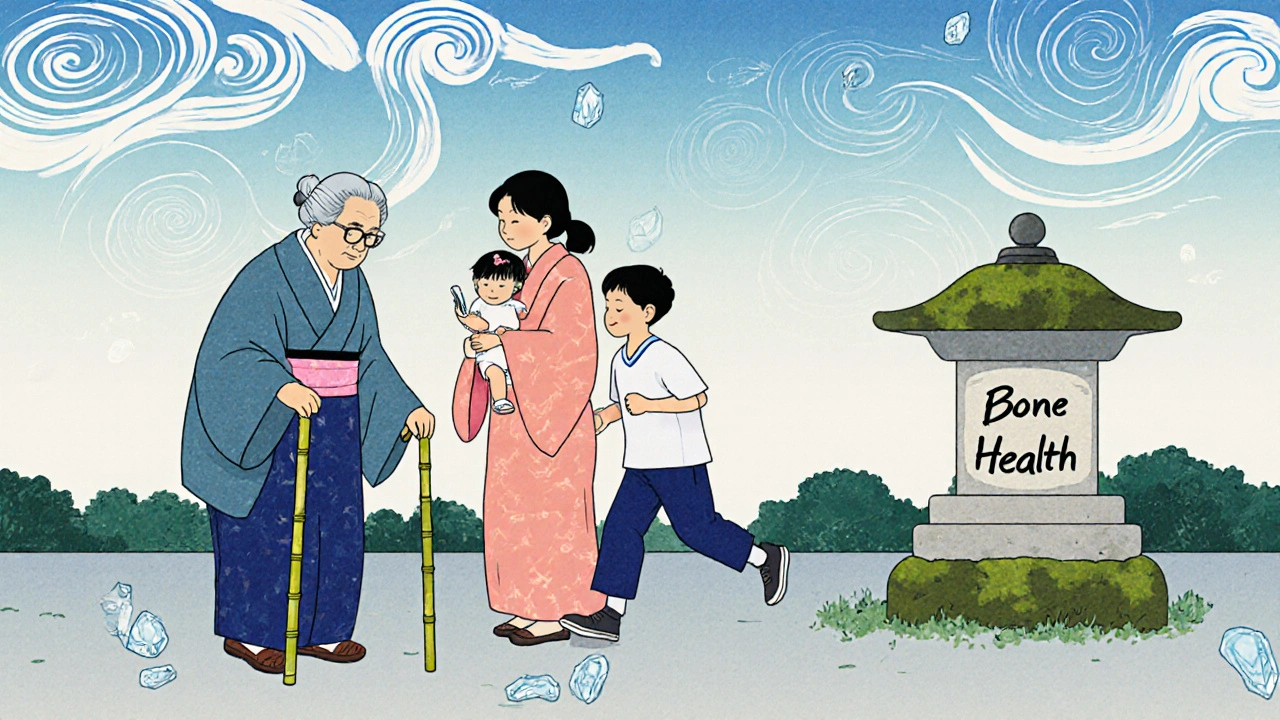
When you’re on hormonal birth control, you hear a lot about blood clots, mood changes, or weight gain. But one question that rarely gets talked about is this: desogestrel and your bones. Does taking a pill with desogestrel-like Cerazette or other progestin-only contraceptives-put you at risk for weaker bones? Or could it even help? The answer isn’t simple, but it’s not as scary as some online posts make it sound.
What is desogestrel, really?
Desogestrel is a synthetic progestin, a lab-made version of the hormone progesterone. It’s the active ingredient in many progestin-only pills (POPs), also called the "mini-pill." Unlike combined hormonal contraceptives that have estrogen and progestin, desogestrel-only pills don’t contain estrogen. That’s why they’re often prescribed to people who can’t take estrogen-because of migraines with aura, a history of blood clots, or breastfeeding.
Desogestrel works mainly by thickening cervical mucus to block sperm and sometimes by stopping ovulation. But hormones don’t just affect your reproductive system. They talk to your bones, your brain, your skin, and your metabolism. That’s why questions about bone health come up.
Why bone health matters
Your bones aren’t just scaffolding-they’re alive. Every year, old bone breaks down and new bone forms. This process, called remodeling, slows down as you age. Around age 30, most people reach peak bone mass. After that, you lose more than you gain unless you take steps to protect your bones.
Low bone density can lead to osteoporosis, which increases fracture risk. Women are especially vulnerable after menopause because estrogen drops. But even before menopause, things like low body weight, smoking, lack of vitamin D, or long-term steroid use can weaken bones. So if you’re on a hormonal contraceptive for years, it’s fair to ask: is it helping or hurting?
What studies say about desogestrel and bone density
There’s been a lot of confusion because earlier studies on older progestins-like depot medroxyprogesterone acetate (DMPA), the three-month shot-showed clear bone loss. Women using DMPA for over two years lost 1-3% of bone density per year, especially in the spine and hip. That’s why the FDA added a black box warning to DMPA in 2004.
But desogestrel is not DMPA. They’re different chemicals with different effects on the body. A 2021 review in the European Journal of Contraception & Reproductive Health Care looked at 12 studies on progestin-only pills, including desogestrel. The results? No significant bone loss over 2-5 years of use. In fact, some studies showed bone density stayed stable, even in young women under 25.
Another study published in Contraception in 2023 followed 300 women on desogestrel-only pills for three years. Researchers measured bone mineral density (BMD) at the spine and hip using DEXA scans. At the end of the study, average BMD changed by less than 0.5%-well within normal measurement variation. That’s not a loss. That’s noise.
Estrogen’s role-and why desogestrel is different
Estrogen helps keep bone breakdown in check. When estrogen drops, bone loss speeds up. That’s why postmenopausal women need hormone therapy or bone drugs. But progestins like desogestrel don’t suppress estrogen the way DMPA does. DMPA works by shutting down the whole ovarian cycle, so estrogen levels crash. Desogestrel-only pills? They usually let ovulation happen sometimes, and estrogen levels stay in the normal range.
Think of it this way: DMPA is like turning off a light switch. Desogestrel is like dimming the lights a little. Your body still gets enough estrogen to protect your bones.

Who should be concerned?
Most people on desogestrel don’t need to worry. But there are exceptions:
- Women under 18 whose bones are still developing
- Those with a history of eating disorders or low body weight (BMI under 18.5)
- People taking corticosteroids long-term
- Those with a family history of early osteoporosis
- Smokers or people with very low vitamin D levels
If you fall into one of these groups, talk to your doctor. You might need a DEXA scan before starting, or you might be advised to take extra vitamin D and calcium. But even then, the risk from desogestrel alone is low.
What you can do to protect your bones
Whether you’re on desogestrel or not, bone health depends on lifestyle-not just pills. Here’s what actually works:
- Get enough vitamin D. Aim for 800-1000 IU daily. In New Zealand, even in summer, many people are low. A blood test can check your levels.
- Take calcium. 1000 mg per day from food or supplements. Dairy, leafy greens, fortified plant milks, and canned fish with bones are good sources.
- Move your body. Weight-bearing exercise-walking, running, lifting weights, dancing-tells your bones to get stronger. Even 30 minutes a day, five times a week, makes a difference.
- Avoid smoking and limit alcohol. Both interfere with bone formation.
- Don’t skip meals. Severe calorie restriction or eating disorders can crash hormone levels and hurt bone density, no matter what birth control you’re on.
What about other progestin-only pills?
Not all progestins are the same. Norethindrone and levonorgestrel are used in other POPs. Some small studies suggest they might have slightly more impact on bone than desogestrel, but the evidence is thin. The biggest difference isn’t the pill-it’s whether you’re still ovulating and producing estrogen. Desogestrel tends to preserve ovulation better than older progestins, which might explain why it’s gentler on bones.

What if you’ve been on it for years?
If you’ve been taking desogestrel for five or more years and you’re worried, get a DEXA scan. It’s a quick, painless X-ray that measures bone density. If your score is normal, you’re fine. If it’s borderline, your doctor might suggest lifestyle tweaks or a switch to a different method. But don’t stop your pill without talking to your provider. Unplanned pregnancy carries far greater health risks than any small change in bone density.
The bottom line
There’s no strong evidence that desogestrel causes bone loss. Unlike DMPA, it doesn’t crash estrogen levels. Most women on desogestrel-only pills maintain healthy bone density over time. The real threats to bone health are poor nutrition, lack of exercise, smoking, and extreme weight loss-not the pill.
That doesn’t mean you should ignore your bones. Stay active, get your vitamin D checked, eat enough calcium, and talk to your doctor if you have risk factors. But if you’re on desogestrel because it’s the safest option for you, you don’t need to fear your bones are crumbling.
Your contraception choice should be about your overall health-not fear. And right now, the science says desogestrel is one of the safer options when it comes to your skeleton.
Does desogestrel cause osteoporosis?
No, desogestrel does not cause osteoporosis. Unlike the injectable contraceptive DMPA, which can reduce bone density with long-term use, desogestrel-only pills do not suppress estrogen enough to significantly affect bone health. Studies tracking women for up to five years show no meaningful loss in bone mineral density. Osteoporosis is caused by long-term estrogen deficiency, severe malnutrition, or steroid use-not by desogestrel.
Is desogestrel safe for young women under 20?
Yes, desogestrel is considered safe for young women under 20. While peak bone mass is still being built until around age 25, studies show that desogestrel does not interfere with this process. Unlike DMPA, which is not recommended for teens without careful monitoring, desogestrel preserves normal estrogen levels and ovulation in most users. As long as the teen has a healthy diet, gets enough vitamin D and calcium, and exercises regularly, there’s no reason to avoid desogestrel.
Should I get a bone density scan if I’m on desogestrel?
Most people on desogestrel don’t need a bone density scan. However, if you’re underweight (BMI under 18.5), have an eating disorder, smoke, take steroids, or have a family history of early osteoporosis, your doctor may recommend a DEXA scan before or after starting the pill. Otherwise, routine screening isn’t necessary. Lifestyle factors matter more than the pill itself.
Can I switch to a different birth control if I’m worried about my bones?
Yes, you can switch, but not because desogestrel is harming your bones. If you’re concerned, talk to your provider about alternatives like the copper IUD (which doesn’t affect hormones), or a combined pill with estrogen (if you’re eligible). But switching just to protect your bones isn’t medically needed with desogestrel. The real risks to bone health come from diet, activity, and smoking-not this pill.
Does desogestrel affect bone health differently during breastfeeding?
No, desogestrel doesn’t affect bone health differently during breastfeeding. In fact, it’s one of the preferred contraceptive options while nursing because it doesn’t reduce milk supply. Breastfeeding itself can temporarily lower bone density as calcium is used for milk production, but this usually recovers within six months after weaning. Desogestrel doesn’t make this worse. Getting enough calcium and vitamin D during this time is the key.
What to do next
If you’re on desogestrel and feeling good, keep going. If you’ve been on it for years and never thought about your bones, now’s a good time to check your vitamin D levels and start walking more. If you’re worried about your bone health, talk to your doctor-not Google. Most people on this pill have nothing to fear. Your bones are stronger than you think.
Honestly, this post saved me from panic-scrolling last night. I’ve been on Cerazette for 4 years and was convinced my bones were turning to dust. Turns out, I just need to stop sitting on the couch and get some sun. Thanks for the clarity.
As a clinician who’s seen patients stress over this exact thing, I appreciate how well-researched this is. The DMPA vs. desogestrel distinction is critical - so many people conflate them. The 2023 study cited? Solid. And the lifestyle advice? Spot on. Vitamin D isn’t optional, especially in northern latitudes. If you’re on POPs and not getting tested, you’re doing yourself a disservice - not because of the pill, but because of the gap in care.
Of course it’s ‘not scary’ - because Big Pharma doesn’t want you to know the truth. They’ve been burying bone density studies since the 90s. You think they’d let a progestin-only pill be ‘safe’ if it actually caused osteoporosis? Wake up. They’re selling convenience, not health.
One must contemplate the metaphysics of hormonal agency - is the body a temple, or merely a vessel for chemical governance? Desogestrel, as a synthetic mimic of progesterone, does not merely alter physiology - it reconfigures the existential dialogue between self and soma. The bone, in its mineralized silence, bears witness to this silent revolution. And yet, we reduce it to DEXA scans and IU counts. How profoundly anthropocentric. The real question isn’t whether it weakens bone - it’s whether we’ve lost the capacity to feel the quiet erosion of autonomy in our daily pharmacological rituals.
LOL. So now we’re told not to fear the pill but to fear… VITAMIN D? 🤡 Next they’ll say smoking’s fine if you take calcium. This is the same BS they fed us about estrogen being ‘bad’ and now it’s ‘not bad enough to matter.’ Trust me - if it were safe, they’d give it to toddlers. #BigPharmaLies 😈
It is my professional opinion that the tone of this article, while ostensibly informative, exhibits a troubling degree of complacency toward long-term endocrine modulation. The dismissal of potential cumulative effects over a decade or more is not scientifically rigorous. One cannot merely assert ‘no significant loss’ without longitudinal data beyond five years. This is the very definition of premature closure.
They say ‘no significant loss’ - but who measured? Who funded the study? Did the same company that makes Cerazette pay for it? And what about the women who lost bone density and weren’t included because they ‘dropped out’? The real data’s buried. I’ve seen three women on POPs break hips by 40. Coincidence? I don’t think so.
This is so helpful!! 🙏 I’m 22, on desogestrel, and breastfeeding right now - I was terrified I was hurting my bones. Now I’m going to start walking with my baby in the stroller and get my vitamin D checked. Thank you for normalizing this conversation. We need more posts like this 💛
nah bro. all birth control messes with your bones. period. stop lying. i know a guy who took the mini pill and his spine looked like a cracker. just sayin’.
Dear author - your article is so well-structured, I almost forgot you work for a pharma marketing team. 😏 But seriously, the vitamin D advice? 1000 IU? In the US? That’s the bare minimum. I’ve seen patients with levels of 12 ng/mL on desogestrel. You need 2000-4000 IU daily if you’re not near the equator. And yes - I’m a doctor. No, I’m not being paid to say this. Just trying to save y’all from osteopenia in 2035.
In India, many women use these pills because they have no access to other options. We don’t have DEXA machines in small towns. But we do have sunlight, lentils, and walking. The truth is simple: eat well, move often, rest enough. The pill is just one thread in the fabric. Don’t let fear unravel the rest.
Wait, so if you’re under 18 and on desogestrel, you’re fine as long as you eat? That’s it? No scans? No follow-up? I’m 19 and I’ve been on it for 2 years - I’ve never had a bone test. Should I be worried? I don’t even know if I get enough calcium. 😅
Good question - and you’re already ahead of most by asking. No, you don’t need a scan yet. But do this: get a 25-OH vitamin D blood test. It’s cheap, covered by insurance, and takes 5 minutes. If it’s under 30 ng/mL, start supplementing. Add a 10-minute walk outside midday. Eat yogurt or fortified soy milk. That’s it. You’re not at risk - you’re just being proactive. And that’s smart.
Everyone’s so obsessed with bones. What about your brain? Your mood? Your libido? Nobody talks about how desogestrel makes you feel like a zombie with a side of apathy. I’ve been on it for 6 years. I cry at commercials. My husband says I ‘don’t light up’ anymore. Bone density? Pfft. I’d trade a few percent of BMD for my spark back.